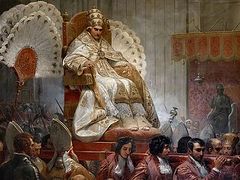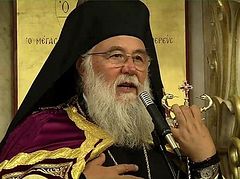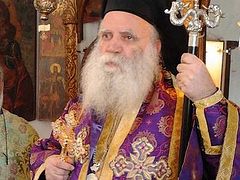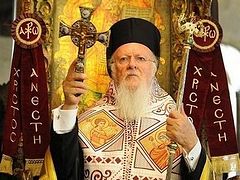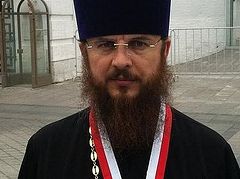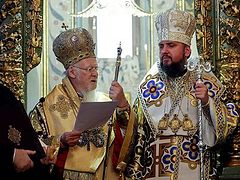To the sacred clergy and the Christian people of our holy Metropolis of Kythira and Antikythera,
Guide me in the paths of salvation, O Theotokos:
for I have befouled my soul with shameful sins
and have wasted all my life in slothfulness.
By thine intercessions deliver me from all uncleanness.
(From the hymn Open Unto Me the Doors of Repentance)
My dear brothers and concelebrants!
My brothers in Christ and beloved children of the Lord!
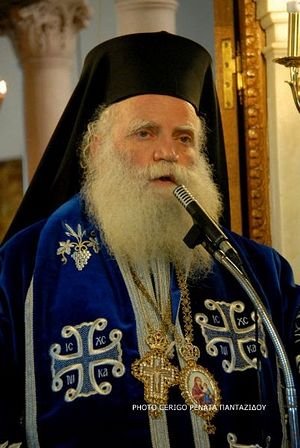 Metropolitan Seraphim of Kythira and Antikythera As we know, the Lenten Triodion lasts seventy days. It begins with the Week of the Publican and the Pharisee and ends on Holy Saturday. The Lenten Triodion includes the first three weeks of preparation for Great Lent, before Cheesefare Sunday. It also includes the sacred time of the holy and Great Forty Days, which begins with Clean Week and continues until the Friday before Lazarus Saturday. The Lenten Triodion also covers Great and Holy Week, which can be called the “Holy of Holies” of the Lenten Triodion: from Holy Monday through Holy Saturday.
Metropolitan Seraphim of Kythira and Antikythera As we know, the Lenten Triodion lasts seventy days. It begins with the Week of the Publican and the Pharisee and ends on Holy Saturday. The Lenten Triodion includes the first three weeks of preparation for Great Lent, before Cheesefare Sunday. It also includes the sacred time of the holy and Great Forty Days, which begins with Clean Week and continues until the Friday before Lazarus Saturday. The Lenten Triodion also covers Great and Holy Week, which can be called the “Holy of Holies” of the Lenten Triodion: from Holy Monday through Holy Saturday.
At the beginning of the Lenten Triodion, we sing with contrite heart: “The doors of repentance do Thou open unto me, O Giver of life,” “Guide me in the paths of salvation, O Theotokos.” Repentance and salvation are the two highest and most sacred spiritual goals to which the aspirations of Orthodox believers should be directed. It is possible to attain them by the grace of our Lord Jesus Christ, through life in the Holy Spirit and in podvigs—both spiritual and bodily, which are a means of returning to our common purpose: to the observance of the Divine commandments and the fulfillment of the will of God.
Repentance!
“Let no one who lives in sin fall into despair,” advises St. John Chrysostom. “But none of the virtuous should give themselves over to carelessness. Let the virtuous not be sure of himself, for such will remain behind the repentant harlot. But let the sinner not despair, because it is possible that he will overtake the first (by sincere repentance)… When we turn away from sin and are filled with ardent love for God, He forgets the former. God is not like people. He does not punish for our previous actions (of which we sincerely repented). And if we have repented, He does not ask why we squandered so much time. He loves us and does not reject us when we return to Him. It is enough only to return in the proper manner (through sincere repentance).1
“When houses fall into disrepair, we always renovate them,” St. John Chrysostom says in another place. “We ought to do the same with ourselves. Have you sinned today? That is, has your soul fallen into decay (have you become the old man)? Despair not, do not commit another fall, but restore your spiritual home. How? By repentance, tears, confession, and good deeds. And never stop doing it.”2
Repentance and salvation!
“Salvation,” St. John Chrysostom underlines, “is achieved not by our labors, not by our podvigs, but by love; but not only by God’s love, and not only by our virtues. For if salvation were attained only by His love, then we would all be saved. And were it achieved simply by our virtue, then the coming of the Lord and all the acts of the Divine economy would be superfluous. However, (our salvation) is accomplished not only by Divine love, and not only by our virtue, but by the joint action of one and the other.”3
My brothers,
“Guide me in the paths of salvation, O Theotokos,” we sing during the time of the sacred and soul-saving Lenten Triodion. Repentance and salvation! Repentance is the true path of a God-loving Christian life in Christ and in the Holy Spirit. Repentance is the blessed path to our Lord and God and the most God-pleasing way of life. True repentance throughout our entire life guides us along the safe path and unswervingly leads to salvation in Jesus Christ, for there is none other name under Heaven given among men, whereby we must be saved (Acts 4:12).
Life in repentance and its orientation towards salvation in Christ shields us spiritually and protects us from slavery and the yoke of the devil, and wards us from evil spirits, from sin, and from every evil.
By means of a gradual removal of non-fasting foods and the entrance into the spiritual fast, with prayer and long Church services, with constant reminders of repentance and the need for spiritual sobriety, the Lenten Triodion helps the faithful in spiritual warfare and assists in spiritual work. On the other hand, the “worldly triodion” (with a lowercase letter), that is, wasting these special days wandering along the roads and back alleys of sin, and even among carnival disguises and festivals, disorients a man and alienates him from the spirit of devout prayer, spiritual struggle, and blessed turning to the Lord in this holy time.
To the issues that deserve fervent prayer “on the field of virtues,” we add the following: a complete cessation of the fires (large and ongoing) on the continent of Australia, the cessation of the strong seismic vibrations in our neighboring country to the east, the elimination of the looming threat of war, the removal of the threats of an earthquake in the country bordering us to the north—Albania—and the speedy restoration of what has been destroyed in both countries.
And most importantly: for the reconciliation and restoration of the Divinely-inspired unity and communion of all the Local Orthodox Churches that make up the One, Holy, Catholic, and Apostolic Church. None of the autocephalous Local Churches, with the exception of three, accept the great canonical violation of recognizing a certain entity made up of schismatic, excommunicated, defrocked, and unordained persons as a canonical “autocephalous Church,” while completely ignoring and disdaining His Beatitude Onuphry, the canonical primate of the Ukrainian Orthodox Church, with a whole host of canonical bishops under him and millions of faithful enduring persecution. And while the canonical Ukrainian Church endures persecution, harassment, and violence, celebrations are being held in honor of the first anniversary of the provision of “autocephaly!”
And just like the eleven autocephalous Churches, we humbly believe that this gaping wound, which is devastating for the holy Body of the One and only Orthodox, Catholic, and Apostolic Church, will not be healed if this most serious of canonical problems will not be resolved on the pan-Orthodox level, by convening a pan-Orthodox council. The passage of more and more time, the exerting of pressure, as well as pompous Divine services and joint prayers with representatives of other confessions and other religions only deepens the wounds instead of healing them. We fear that the proposed visit of the head of the Vatican in the footsteps of the apostle Paul—to those places where the great “apostle to the Gentiles” traveled—will bring no good fruits. This can happen only under one condition: if first of all, the theology and ecclesiology of the great “apostle to the Gentiles” Paul is fully recognized, with great humility and fitting modesty, and heretical teachings are renounced, accompanied by sincere and salvific repentance out of love for God.
With heartfelt wishes for a blessed, peaceful, and fruitful time of the Lenten Triodion, good repentance, and the salvation of your souls, I remain, with paternal prayers and love in Christ,

